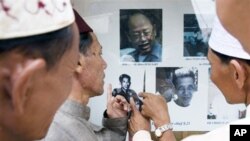International legal observers of the Khmer Rouge tribunal say the apparent political pressure for two controversial cases have become a core issue in the legitimacy of the UN-backed court.
Government leaders and some Cambodian judges object to the prosecution of five more Khmer Rouge suspects in two cases, Nos. 003 and 004, a view that is not supported by the international prosecutor at the court nor by many of the victims of a regime responsible for the deaths of at least 1.7 million people.
Concern over the legacy of the court has come to the fore in recent weeks, as the tribunal moves toward a trial of four jailed leaders but has failed to advance cases 003 and 004.
Now the Cambodian and UN investigating judges, You Bunleang and Siegfried Blunk, are at odds with prosecutor Andrew Cayley, who says he will fight an order from their office to rescind public statements outlining further investigation he said is needed in the case.
Brad Adams, Asia director for Human Rights Watch, told VOA Khmer that the two judges had failed to seriously investigate the case, including interviewing the two suspects.
“Any impartial court would say that Cayley is in fact the one who operated professionally, and Blunk and You Bunleang are the ones who operated in a political way and unprofessionally,” he said in a phone interview from London.
Prime Minister Hun Sen has been firmly against further investigation and indictments. But the court is supposed to find truth and justice for victims, he said.
“If the UN can’t do that, it should walk always, because the Cambodian side is very capable of having a fake trial and having a politically motivated trial and outcome,” he said. “They don’t need the UN to do that.”
Government spokesman Phay Siphan dismissed allegations of political influence in the courts in the decision of judges.
However, John Ciorciari, a professor of public policy at the University of Michigan, said public statements of government officials objecting to cases 003 and 004 fuel suspicions of political interference that can hurt the overall legitimacy of the tribunal.
“If cases 003 and 004 are indeed dismissed, Case 002 can still proceed, but it will be tainted by the public knowledge that the tribunal is subject to tight political control and even instances of blatant interference,” he said.
Meanwhile, he said, Cayley is within his rights under tribunal regulations to issue public statements that summarize his submissions. The April 29 conclusion statement by investigating judges, he said, give the appearance that the cases were given “short shrift.”
Jeffrey Brand, dean of the University of San Francisco’s School of Law, said the judges’ retraction order against Cayley was further evidence the tribunal was not going to move forward with cases 003 and 004.
Such orders “do not adequately protect the interests of the victims,” he said. The judges “seem more concerned with [Cayley’s] opinion that further investigation is necessary than with any facts that were actually divulged.”
Some critics see the current rifts in the court as a threat to one of its chief mandates: to help Cambodians overcome the trauma of the Khmer Rouge through the pursuit of a high standard of justice.
Hang Chhaya, executive director of the Khmer Institute for Democracy, said on “Hello VOA” Monday that the court’s failure to do so would do more harm.
“If we can’t do this, what we previously planned and promised, then it seems they’ve become victims again,” he said. “That’s what we’re concerned about.”




